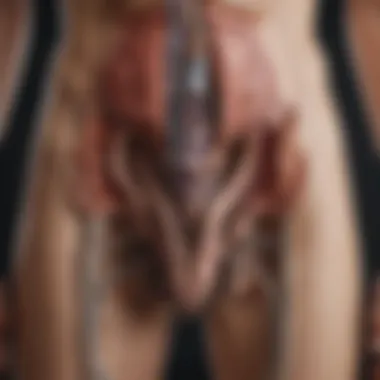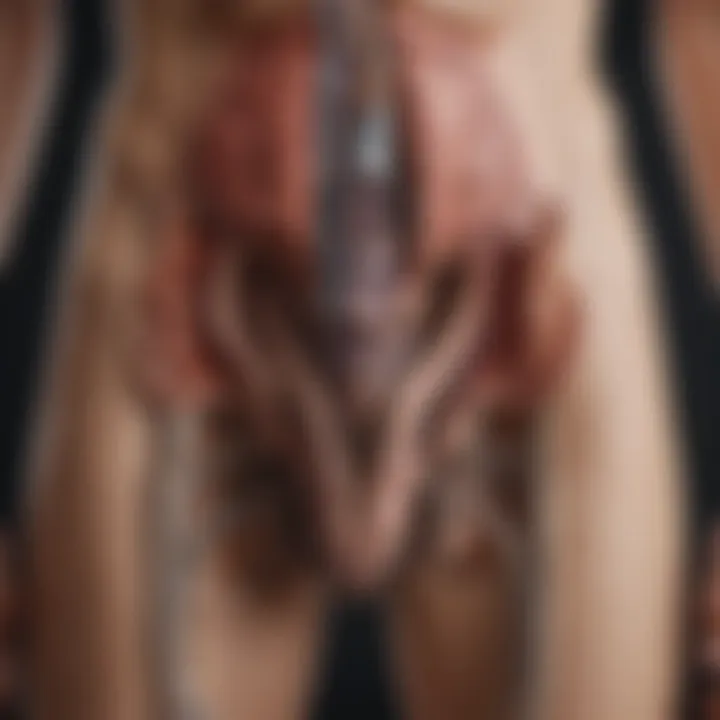Understanding Nocturia: Challenges of Nighttime Urination


Intro
During the night, many people may find themselves facing the need to urinate multiple times. This condition is known as nocturia. It is not just annoying; it can adversely affect sleep quality and overall well-being. Understanding nocturia requires a clear exploration of its causes, impacts, and management strategies.
This article will provide an informative guide that addresses these facets in depth. By recognizing the physiological and psychological factors intertwined with nocturia, readers can better understand their own experiences or the challenges faced by those in their care. Frequent nighttime urination can stem from various sources, including medical conditions, lifestyle habits, and even diet.
Engaging with this article can help foster informed decision-making and promote healthier living. Thus, understanding nocturia is important not just for those experiencing it but also for health professionals working to support individuals affected by this condition.
Key Takeaways
- Nocturia is characterized by the need to urinate frequently at night.
- It affects individuals across all demographics but may be more common in older adults.
- Underlying causes include medical conditions, medications, and lifestyle choices.
- Management strategies vary, with both practical lifestyle modifications and medical treatments available.
Nocturia can significantly impact quality of life, leading to fatigue and possible health complications.
Prevalence and Statistics
Nocturia is a common issue. Studies estimate that around 50% of adults aged 60 and older experience nocturia, while younger adults may have lower rates. Statistically, it may not receive as much attention as other health issues, but its effects can be profound for those affected. For example, a study in the American Urological Association (AUA) journal highlighted that many patients report nocturia impacting their daily activities.
Practical Tips
- Limit Fluid Intake
- Review Medications
- Adjust Eating Habits
- Establish a Sleep Routine
- Consult Health Professionals
- Reducing liquids in the evening hours can help prevent nighttime trips to the bathroom.
- Consult with healthcare providers about diuretics or other medications that may contribute to nocturia.
- Avoid large meals close to bedtime. Pay attention to the consumption of caffeine and alcohol.
- Creating a consistent sleep schedule may help improve overall sleep quality.
- Seeking guidance from a doctor or a healthcare expert can provide tailored strategies for effectively managing nocturia.
Prelude to Nocturia
Understanding nocturia is crucial, especially for those in health-related fields. This condition can significantly affect individuals and their daily routines. Nocturia refers to waking during the night to urinate, and its prevalence raises several questions about health, lifestyle, and effective management.
Definition of Nocturia
Nocturia is defined as the need to awaken at night to urinate. It is not merely a nuisance; it reflects underlying physiological or pathological processes. Distinguishing nocturia from other urinary issues is critical, as it can be a key indicator of various health problems.
Prevalence in Different Age Groups
Nocturia is not restricted to a specific demographic. It becomes more common with advancing age. Studies indicate that about 30% of adults aged 30-49 experience this condition. In older adults, the prevalence can rise to more than 60%. This trend is alarming and may indicate a need for increased awareness and research into its causes and consequences.
Impact on Quality of Life
The impact of nocturia extends beyond physical symptoms. Frequent nighttime urination disrupts sleep, leading to daytime fatigue and decreased productivity. People may experience emotional stress, anxiety, or even depression due to this condition. The inability to maintain a normal sleep schedule often affects social and professional interactions, further complicating an individual's quality of life.
"Nocturia can transform a simple lifestyle into a cycle of interruptions, affecting mental and physical well-being."
In summary, understanding nocturia encompasses its definition, demographic relevance, and significant impact. This foundation is essential for health professionals who aim to address and manage the complexities of this widespread condition.
Physiological Factors Contributing to Nocturia
Understanding the physiological factors that lead to nocturia is crucial for both diagnostics and treatment approaches. This area studies how various body systems interact to affect urinary behavior, especially at night. Comprehending these elements helps health professionals tailor interventions that can substantially improve quality of life for those suffering from frequent nighttime urination.
Bladder Function and Aging
As individuals age, changes in bladder function and capacity are common. The bladder often becomes less elastic and cannot hold as much urine as it used to. This decreased elasticity leads to increased urgency and frequency of urination, particularly at night.
Additionally, older adults may have a reduced ability to concentrate urine. This means that the kidneys produce more dilute urine. As a result, they may need to urinate more often, which disrupts sleep.
Symptoms of an overactive bladder may also intensify with age. Muscle tone in the bladder can decline, making it difficult to retain urine for longer periods. The phenomenon of nocturia is therefore worsened by the interplay of aging and bladder dysfunction.
Hormonal Influences


Hormonal factors play a significant role in regulating fluid balance and urinary function. One key hormone is antidiuretic hormone (ADH), which is responsible for controlling water retention in the body. In younger people and during the daytime, ADH levels increase to promote Urine concentration. At night, usually, ADH levels are high to minimize urine production.
However, changes to the hypothalamic-pituitary axis with age can lead to imbalances. Older adults may produce less ADH in the nighttime hours, resulting in increased urine output while they sleep.
Therefore, hormonal shifts can contribute significantly to nocturia, especially for those with underlying conditions that disrupt this balance, such as diabetes or chronic stress.
Fluid Regulation Mechanisms
Fluid regulation in the body encompasses a complex balance of intake and output. The kidneys are pivotal in this process, filtering blood to produce urine. When fluid intake surpasses the kidneys' ability to concentrate and retain urine, nocturia can occur.
Various factors influence fluid regulation, including diet, medication, and health conditions. For instance, excessive consumption of caffeine or alcohol can lead to increased urine production due to their diuretic effects. In the same way, significant fluid intake in the evening can result in waking up at night for bathroom visits.
Understanding these mechanisms is vital to tackle nocturia effectively. Making informed choices about fluid intake, particularly in the evening, can serve as a practical measure.
Effective management of nocturia often requires a holistic approach, considering these physiological factors alongside lifestyle changes and medical advice.
These physiological aspects form the foundation for understanding nocturia and offer insight into potential management strategies. Identifying the specific factors that contribute to nocturia in individual patients can lead to more effective interventions.
Medical Conditions Associated with Nocturia
The significance of discussing medical conditions associated with nocturia lies in the intricate relationship between underlying health issues and the frequency of nighttime urination. Understanding this connection facilitates better management strategies and highlights the need for healthcare professionals to evaluate patients comprehensively. Nocturia can often act as a symptom rather than an isolated issue, suggesting complicating factors that may need attention. Hence, recognizing these associations enables practitioners to provide a more thorough approach to treatment and lifestyle adjustments.
Diabetes and Nocturia
Diabetes is a prevalent medical condition that can significantly contribute to nocturia. The disease typically disrupts normal hormonal and renal functions, leading to increased urine output. High blood glucose levels cause excessive urination as the kidneys try to remove the excess glucose from the blood. This process usually leads to nocturia, creating disturbances in sleep patterns. Patients may find relief through glycemic control, but underlying kidney health must also be evaluated. Monitoring blood sugar levels and engaging in regular physical activity can also reduce incidences of nocturia in diabetic individuals.
Heart Failure Implications
Heart failure is another medical condition closely associated with nocturia. Patients with this condition often experience fluid retention during the day due to impaired cardiac function. At night, when lying down, the body redistributes fluids, leading to increased renal perfusion and subsequent urination. This nocturnal symptom can significantly affect the quality of life, creating fatigue and anxiety due to disturbed sleep. Effective management of heart failure through diuretics and lifestyle changes, like reducing sodium intake, can help minimize the frequency of nighttime urination.
Chronic Kidney Disease Impacts
Chronic kidney disease (CKD) often correlates with nocturia as kidney function deteriorates. Patients may face altered urine concentration abilities, causing excessive urine output, particularly at night. Additionally, CKD can lead to imbalances in electrolytes, further aggravating urination patterns. Early recognition of kidney health is crucial, and regular screening can assist healthcare providers in managing nocturia in CKD patients, enabling better strategies to preserve renal function and overall well-being.
Sleep Apnea Linkage
The relationship between sleep apnea and nocturia should not be overlooked. Individuals suffering from sleep apnea frequently experience disturbed sleep patterns, leading to desaturation of oxygen levels during the night. This disturbance can activate the body's sympathetic nervous system, creating a heightened need for urination as a side effect. Treating sleep apnea with continuous positive airway pressure (CPAP) therapy often alleviates nocturia. Addressing sleep quality through lifestyle modifications can also provide significant improvements in nocturnal urination and overall sleep health.
Lifestyle Factors Influencing Nocturia
Understanding the lifestyle factors that influence nocturia is essential for health professionals and individuals alike. These factors encompass dietary choices, physical activities, and habits that can exacerbate or alleviate nighttime urination. By modifying these elements, one could significantly impact their nocturia symptoms and improve overall quality of life.
Caffeine and Alcohol Intake
Caffeine is a well-known diuretic. Its consumption can lead to increased urine production, hence worsening nighttime bathroom trips. It is advisable to limit caffeine intake, particularly in the afternoon and evening hours. Common sources of caffeine include coffee, tea, soda, and energy drinks. Reducing these beverages may lessen the frequency of nocturia.
Alcohol serves a similar purpose. While it can initially have a sedative effect, it often leads to increased urination later on. Alcohol can disrupt the body’s ability to retain fluids. As a result, limiting alcohol consumption close to bedtime is a practical measure in managing nocturia symptoms.
Diet and Hydration Patterns
Diet plays a fundamental role in fluid management. Certain foods and fluids encourage greater fluid retention, while others can trigger more frequent urination. Foods rich in sugar or high in sodium can also contribute to nocturia. Maintaining a balanced diet is crucial.
Hydration patterns also need attention. Drinking large amounts of fluids shortly before bedtime increases the likelihood of needing to urinate at night. It’s generally wise to taper off fluid intake a few hours before sleep. Advocating for a consistent hydration routine throughout the day can help balance fluid levels better, allowing for less urgency during the night.
Exercise and Physical Activity
Physical activity has various health benefits. Regular exercise improves circulation and strengthens the bladder muscles. This can lead to better control over urination. On the other hand, vigorous exercise right before bed could temporarily disrupt sleep patterns and affect bladder control. Therefore, striking a balance in exercising earlier in the day is preferable.
Also, mindfulness practices like yoga or pilates may aid in reducing stress, which associates with nocturia. Stress can heighten the urge to urinate and disrupt sleep, hence managing stress through physical activity can be helpful.
"Effective management of nocturia often begins with a few changes in lifestyle habits, such as reducing caffeine and alcohol intake, monitoring dietary choices, and finding time for regular exercise."
Psychological Considerations
Psychological aspects play a crucial role in understanding nocturia. The connection between mental and physical health is well-documented. Individuals who experience nocturia often report higher levels of emotional distress. Anxiety and stress can not only contribute to nocturia but also exacerbate its effects. Anxiety can lead to hypervigilance regarding bodily functions. This results in frequent urination during the night or disturbances in sleep patterns. Furthermore, it creates a cycle; discomfort may lead to increased anxiety, perpetuating the issue.
Psychological considerations also encompass the impact of sleep disorders on nocturia. Many people suffering from conditions like insomnia or sleep apnea have reported heightened nocturia symptoms. Therefore, addressing psychological health provides a dual benefit: improved mental well-being and potentially reduced nocturia frequency. Understanding this interrelation is pivotal for effective management strategies.


Sometimes, mental health issues hinder individuals from addressing nocturia. Many may feel embarrassed or reluctant to discuss their experiences with healthcare providers. Finding ways to encourage open conversations about nocturia can facilitate better outcomes. As such, mental health professionals, wellness coaches, and fitness trainers should remain aware of this connection to better assist their clients.
"The relationship between psychological factors and nocturia is often underestimated, yet it plays a key role in treatment and quality of life improvement."
Anxiety and Stress Effects
Anxiety and stress manifest in various forms. Both can significantly impact an individual's physiological functions, including bladder control. Studies indicate that elevated anxiety levels can lead to increased urinary urgency. When stressed, the body's response might trigger the need to urinate more frequently. This relationship can become even more pronounced at night, leading to multiple awakenings.
In practical terms, stress management techniques can offer considerable relief. Techniques such as mindfulness, meditation, or yoga can help mitigate anxiety. Integrating these practices into daily routines may decrease nocturia occurrences. Likewise, wellness coaches and mindfulness instructors can play an essential part in teaching these techniques. Understanding and articulating these psychological components can lead to better self-management and improved quality of life for affected individuals.
Sleep Disorders Connection
The relationship between sleep disorders and nocturia is critical yet often overlooked. Conditions like sleep apnea and insomnia can lead to fragmented sleep patterns. Resulting disruptions in the body's natural rhythms may lead to increased incidences of nocturia. When sleep is disturbed, the body's hormonal regulation of fluids may become impaired, resulting in higher nighttime urination.
Additionally, many people with sleep disorders report feeling more anxious due to their disruptions. This creates a compounding effect on nocturia. Addressing the underlying sleep issue can often reduce nocturia symptoms effectively. Sleep specialists and healthcare providers must consider both conditions during assessment and treatment.
In summary, psychological aspects directly affect nocturia experiences. Increased anxiety, stress, and disrupted sleep patterns create a complex interplay that worsens the condition. Thus, a holistic approach toward treatment should be prioritized, aiming to treat both nocturia and its psychological contributors.
Evaluation and Diagnosis
Evaluating and diagnosing nocturia is crucial for identifying the underlying causes and effectively managing the condition. Frequent nighttime urination can stem from various physiological and psychological factors, making accurate assessment necessary for tailored treatment. Through clinical evaluation and diagnostic testing, healthcare providers can discern the root causes of nocturia, leading to better management strategies and improved patient outcomes.
When healthcare professionals assess a patient for nocturia, several key elements come into play, such as medical history, symptom severity, and other health conditions. Understanding these components helps in identifying potential links between nocturia and associated medical issues, leading to a more comprehensive approach to treatment. Consideration of patient lifestyle, medications, and concurrent disorders is essential. This not only informs diagnosis but also helps in educating patients on lifestyle adjustments that may alleviate symptoms.
Additionally, a detailed understanding of the diagnostic process enhances both patient and clinician confidence in addressing nocturia. With proper evaluation, healthcare providers can create personalized management plans, drawing from a wide array of therapeutic options.
Clinical Assessment Techniques
Clinical assessment for nocturia typically begins with a thorough medical history review. Physicians inquire about:
- Frequency and duration of nighttime urination
- Daytime urinary habits
- Fluid intake patterns
- Sleep quality and disturbances
- Presence of other symptoms such as fatigue or urinary urgency
Next, a physical examination may be conducted to evaluate overall health, focusing on abdominal and pelvic areas. Physicians might look for signs of bladder dysfunction, prostate enlargement in men, or other structural abnormalities.
In cases where primary symptoms are unclear or if significant comorbidities exist, additional assessment techniques could be employed:
- Urinary Diary: Patients may be asked to maintain a record of their urination patterns for a few days. This diary tracks the timing and volume of fluid intake and output during both day and night.
- Post-Void Residual Measurement: A bladder scan or catheterization can determine how much urine remains in the bladder after urination. High residual volume can indicate bladder complications.
- Medication Review: Some medications contribute to increased nocturia. Assessing current prescriptions and over-the-counter drugs can reveal potential culprits.
Urinalysis and Other Tests
Urinalysis is a vital diagnostic tool in evaluating nocturia. A simple urine test can reveal essential information about kidney function and urinary system health. Common aspects assessed in urinalysis include:
- Specific Gravity: Determines urine concentration, which can indicate hydration status and kidney function.
- pH Levels: Abnormal urine pH might suggest metabolic or dietary imbalances.
- Presence of Blood or Protein: These elements could indicate underlying issues, such as a urinary tract infection or kidney disease.
Other tests may include:
- Blood Tests: To evaluate kidney function and rule out systemic conditions that could lead to nocturia.
- Sleep Studies: For patients suspected of having sleep apnea, polysomnography can assess sleep patterns and interruptions, linking them to nocturia.
Timely evaluation and precise diagnosis are essential for addressing nocturia effectively. By understanding the various clinical assessment techniques and diagnostic tests available, healthcare professionals can draw meaningful conclusions about the underlying factors contributing to their patients' condition. This, in turn, informs appropriate management strategies, ensuring patients can regain control over their nighttime functioning.
Management Strategies for Nocturia
Managing nocturia is crucial for improving the quality of life for those affected by frequent nighttime urination. As we explore different management strategies, it becomes evident that a multi-faceted approach is essential. Understanding and implementing effective strategies can alleviate symptoms and help individuals regain restful sleep.
In this section, we will discuss practical lifestyle modifications, medical treatment options, and behavioral therapies. Each element plays a role in addressing the underlying causes of nocturia and can lead to significant improvements in an individual's health and well-being.
Practical Lifestyle Modifications
Adapting daily habits can make a notable difference in managing nocturia. Several lifestyle modifications can be easily integrated into routine life. Here are key suggestions:
- Fluid Intake Timing: Limit fluid consumption in the evening. Encouraging fluid intake to be front-loaded during the day may help reduce nighttime urination.
- Dietary Changes: Certain food and drink can exacerbate nocturia. Avoiding caffeine and alcohol in the evening is advisable, as they have diuretic properties. Spicy foods may also irritate the bladder, so consider reducing their consumption.
- Bladder Training: This involves gradually increasing the time from one bathroom visit to the next during the day. It could help the bladder hold more, possibly reducing nighttime trips.
"Simple changes, like adjusting when you drink fluids, can have a substantial impact on nocturia."
Incorporating these modifications into daily life creates a supportive structure for better bladder health. Considering potential benefits against ease of implementation is a key factor in the success of these adjustments.
Medical Treatment Options


For individuals who find lifestyle modifications insufficient, medical treatment options are available and should be explored under the guidance of a healthcare professional. Various medications are prescribed based on specific symptoms and underlying causes. Common treatments include:
- Anticholinergics: These may help decrease bladder contractions and increase capacity, potentially reducing episodes of nighttime urination.
- Desmopressin: This medication can reduce urine production at night, which is particularly beneficial for those with nocturnal polyuria.
- Beta-3 Adrenergic Agonists: They can help relax the bladder muscle, promoting storage and reducing urgency.
It is critical to work with a healthcare provider to determine suitable options tailored to individual need and response. Efficacy and side effects should be monitored regularly.
Behavioral Therapies
Behavioral therapy can also play a vital role in managing nocturia. These techniques aim to reshape behaviors that contribute to the condition. Here are some notable approaches:
- Cognitive Behavioral Therapy (CBT): This method addresses the interplay between thoughts, feelings, and behaviors. It can help individuals develop coping strategies to deal with anxiety and stress that may be exacerbating their symptoms.
- Pelvic Floor Exercises: Strengthening pelvic muscles can improve bladder control and decrease urgency. Supervised programs often lead to better results.
- Biofeedback: This technique can help individuals gain more awareness of their pelvic floor muscles and gain additional control over their urination habits.
By focusing on behavioral aspects and the psychological implications of nocturia, individuals can enhance their management processes. A combination of lifestyle changes, medical treatments, and behavioral therapies allows for a holistic approach to address nocturia effectively.
The Role of Nutrition
The nutritional aspect is critical when examining nocturia. Food choices and hydration habits can greatly influence urinary production, leading to nighttime awakenings. A well-planned diet can minimize these disturbances and help individuals manage their symptoms effectively. Particular attention should be given to meal timing and content, as well as fluid intake before bed.
Foods to Avoid Before Bed
Several food items can worsen nocturia symptoms if consumed close to bedtime. It is advisable to avoid or limit the following:
- Caffeine: Present in coffee, tea, and many sodas, caffeine is a stimulant that can increase urine production and disrupt sleep.
- Alcohol: While alcohol may initially promote sleep, it can lead to increased nighttime urination as the body processes it.
- Spicy Foods: These can irritate the bladder, leading to urgency and frequency of urination.
- High-Sugar Foods: Foods with a lot of sugar can prompt increased thirst and, therefore, more urination at night.
Minimizing these foods in the evening can significantly reduce the likelihood of being awakened during the night to urinate.
Hydration Guidance
Adequate hydration is vital, but timing matters. It is essential to drink enough throughout the day to stay hydrated without overloading the bladder at night. Here are a few considerations:
- Limit Fluid Intake in the Evening: Reducing fluids two to three hours before bedtime can help decrease nocturnal urination. This allows the bladder to empty before sleep starts.
- Choose Hydrating Foods: Incorporating foods with high water content, such as cucumbers and watermelon, can help maintain hydration without excessive fluid intake.
- Monitor Color of Urine: A light straw color indicates sufficient hydration. Darker urine can imply dehydration, which can prompt increased thirst later in the evening.
In summary, adopting a thoughtful approach towards nutrition and hydration can play an essential role in managing nocturia. By being aware of what to consume and when, individuals can reduce the frequency of nocturnal awakenings.
Long-term Implications of Nocturia
The long-term implications of nocturia are significantly relevant for both patients and health professionals. Frequent nighttime urination can lead to multiple challenges that extend beyond simple inconvenience. Understanding these challenges is essential for effective management and overall well-being. The implications cover not only physical health but also psychological and social aspects, which can compound the difficulties faced by individuals experiencing this condition.
Correlation with Other Health Issues
Nocturia often serves as a symptom or indicator of underlying health problems. Research has shown that it correlates with various medical conditions, ultimately affecting a person's quality of life. Some of these conditions include:
- Diabetes: Individuals with diabetes may experience increased urination as blood sugar levels fluctuate.
- Heart Failure: Fluid retention issues can modify nighttime urination patterns, complicating both diagnosis and treatment.
- Hormonal Imbalances: Hormones play a crucial role in bladder control. For example, changes in hormone levels due to aging can heighten the prevalence of nocturia.
Failing to recognize these connections can lead to misdiagnosis or delayed treatment. Therefore, identifying and addressing the interconnected nature of nocturia and other health issues provides an avenue for holistic patient management.
Psychosocial Effects
The psychosocial effects of nocturia can be profound. Inability to sleep soundly due to frequent bathroom visits can lead to a cascade of issues such as:
- Anxiety and Depression: The stress of disrupted sleep can foster mental health problems.
- Social Isolation: Individuals may withdraw from social situations due to embarrassment or fear of needing immediate access to a restroom.
- Reduced Quality of Life: Overall well-being can diminish, leading to lower productivity at work and a lack of engagement in personal activities.
Understanding the psychological dimensions of nocturia is crucial for comprehensive treatment.
In summary, the long-term implications of nocturia are manifold. Recognizing the connections it has with other health issues is essential. Furthermore, understanding its psychosocial effects can lead to better support and management strategies. This layered knowledge is invaluable for health professionals and can greatly improve outcomes for affected individuals.
Culmination
The conclusion serves as a critical component of the article on nocturia. It synthesizes the vast array of information presented, reaffirming the significance of understanding this condition. Nocturia affects many individuals across different age groups and has substantial implications for their overall health and well-being.
Summary of Key Points
In reviewing nocturia, the main points to highlight include:
- Definition and Prevalence: Nocturia is defined by the frequent need to urinate during the night, impacting sleep quality and overall life.
- Physiological Factors: Various factors contribute to nocturia, such as aging bladder functions, hormonal changes, and fluid regulation.
- Medical Conditions: Conditions like diabetes, heart failure, and kidney disease significantly correlate with nocturia.
- Lifestyle Influences: Diet, caffeine, and alcohol can exacerbate nocturia symptoms. Physical activity also plays a role.
- Psychological Factors: Anxiety and stress can lead to increased nocturia. Connection to sleep disorders is also noteworthy.
- Management Strategies: Effective management includes lifestyle changes, medical treatment options, and behavioral therapies.
- Nutrition's Role: Nutrition impacts nocturia significantly. Certain foods may worsen symptoms, while proper hydration can help.
- Long-term Implications: Chronic nocturia can lead to other health issues and psychosocial effects, which necessitate a holistic approach to management.
Final Thoughts on Management
Understanding nocturia is essential for both patients and healthcare providers. The condition is not merely an inconvenience but a sign of potential underlying health issues that warrant closer examination. Implementing management strategies can lead to improved quality of life.
- Patients should consult healthcare professionals to address nocturia effectively.
- Regular follow-ups can help monitor changes and adjust treatment.
- Education about factors that affect nocturia can empower individuals to take proactive steps.
In sum, nocturia is a complex condition with multidimensional impacts. Taking a thoughtful approach to its management allows individuals to lead healthier lives, enhancing their well-being in the long run.







